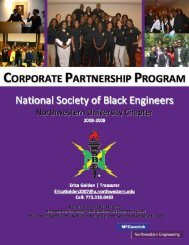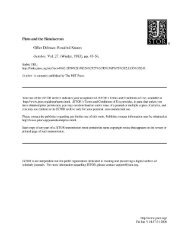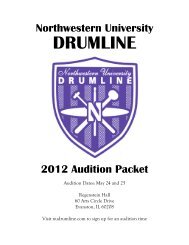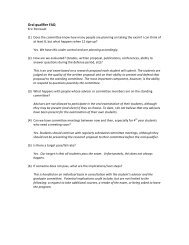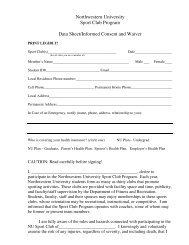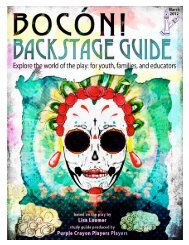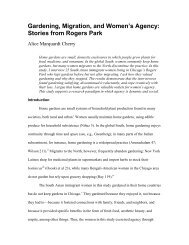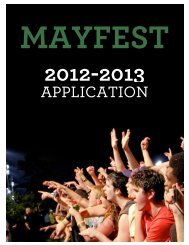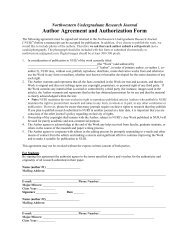RESEARCHFEMALE ENTREPRENEURSHIP INDAKAR, SENEGAL:Factors, Pathways, and ObstaclesKatherine NorthcottDEPARTMENT OF ECONOMICSPROGRAM OF AFRICAN STUDIESHilarie LiebFACULTY ADVISORDEPARTMENT OF ECONOMICSUsing a combination of quantitative surveys and personalinterviews, I explored whether certain social, gender-specific, orpolitical issues affect the successful creation and maintenanceof female-owned businesses in Dakar, Senegal. After analyzingthe collected data, I found that the majority women weremarried, highly educated, and more likely to start businesseslater in life and in sectors that are typically female-dominated.From a political standpoint, even though there were severalgovernment initiatives designed to encourage femaleentrepreneurship in the country, the women I interviewed statedthat finding financial support was the most overwhelmingobstacle they encountered when starting their businesses. Iconcluded that more steps need to be taken to ensure thatwomen are able to gain access to the funds that have beencreated for them.Female economic empowerment in the developingworld has been proclaimed as a universal necessityfor the developing economies; the UN included theempowerment of girls and women as their third MillenniumDevelopment Goal, which lists the eight necessaryfactors the developing world must overcome in order tocombat poverty. 1 Various reasons have been offered toexplain the lack of female participation in the workforcein the developing world, including the role of patriarchyand social inequality. However, female entrepreneurshipin the formal, government-regulated sector andinformal, unregulated sector has started to make animpression on the global economy and developmentfocusedeconomic <strong>research</strong> has started to explore itsgrowth. Over a two month period in the summer of2010, I conducted a <strong>research</strong> project in Dakar, Senegal,looking at formal female entrepreneurs. My goal in this<strong>research</strong> project was to meet and interview female, andmale, entrepreneurs in Dakar, and gather demographicinformation about these entrepreneurs. I hoped to identifycertain common characteristics that helped womenbecome entrepreneurs, and understand whether thesequalities differ from men’s. I also wanted to get a senseof the social and political atmosphere surrounding theentrepreneurial experiences of these women. In otherwords, how do women in developing countries succeedat starting their own businesses and what obstacles dothey encounter? While my sample size was small, only13 women and 2 men, I had a good introduction to howfemale entrepreneurs in Dakar succeed, as well as directexperience of where women work and how they financethemselves.DemographicsThe demographics of my sample show that mostof the entrepreneurs are late-middle aged, started thebusiness later in life, and are highly educated. The followingtable summarizes the key demographics frommy <strong>research</strong>:Table 1. DemographicsDemographics Mean MedianAge 51.8667 52Years Living in Dakar 43.0667 50Years of Education 16.333 16Years of Work Experience 19.846 21Years Business has Operated 9.4667 10Number of Employees 23.7333 1048 NORTHWESTERN UNDERGRADUATE RESEARCH JOURNAL
RESEARCHTable 1a. Demographics (percentages of entrepreneurs)DemographicsVOLUME 7, 2011-2012PercentagesMarried 52Divorced 50Widowed 16Never Married 21Support Exterior Households 10Main breadwinner of the family 10With an average age of 51 and an average residencyin Dakar of 43 years, the entrepreneurs spent the majorityof their lives in an urban setting. This setting offersthem access to resources which, outside the city, maynot be accessible or reliable, especially when it comesto banking and government loans. Their businesses onaverage have been open almost 9.5 years, indicating thatthe entrepreneurs decided to start their businesses duringmiddle age, rather than as young people. Prior tostarting their businesses, the entrepreneurs had about20 years of work experience. This may be due to thenecessity to earn a salary in order to support their families,the social pressure of staying home to raise theirchildren, or a desire to save money in order to have thetime and resources to start a company. Some 73% of theentrepreneurs identified themselves as the main breadwinnersin the family, and 67% also said that they supportedhouseholds outside of the one they live in. Fully60% of the entrepreneurs were married, and all but onehad children. Entrepreneurship, then, is also associatedwith finding a way to earn income to support both theimmediate and extended family structure.Overall, only 29% of women can read and write inSenegal. 2 But, women who have access to higher educationhave more opportunities and success in entrepreneurshipthan those who do not. 3 From my sample, theentrepreneurs I met were highly educated, averaging 16years of schooling. Education played an important rolein the profile of entrepreneurs, helping them increasetheir chances of success in the long run.One of the most important statistics was the sizeof their businesses: an average of 23 employees per enterprise,with a median of 10. Most of these businesseswould be classified as small and medium-sized enterprises(petites et moyennes enterprises, or PME, in thelocally spoken French). Comparatively, a microenterprisehas less than 10 employees, a small enterprise hasless than 50 employees, and a medium enterprise has lessthan 250 employees. 4 The women I met, even those whohave what qualify as “microenterprises,” described theirbusinesses as growing and expressed a need for resourcesthat matched that growth. The number of employees didnot necessarily reflect the overall size of the business. Forexample I visited a very successful and well-run doctor’soffice that had only 3 full-time employees.Politics of Female EntrepreneurshipThe Ministry of Female Entrepreneurship and Microfinancehas been continuously reformatted over theyears of President Abdoulaye Wade’s presidency. Theministry has previously been affiliated with the “Ministryof Women, Family, Social Development, and FemaleEntrepreneurship,” the “Ministry of PME, Female Entrepreneurship,and Microfinance,” and the “Ministry ofFamily, National Solidarity, Female Entrepreneurship,and Microfinance.” On a political level, female entrepreneurshipin Senegal is never addressed as an independententity, nor is it associated with the Ministry ofLabour or Commerce. In its current form, female entrepreneurshipcontinues to share a ministry with microfinance:“Ministry of Family, National Solidarity, FoodSecurity, Women’s Entrepreneurship, Microfinance, &Early Childhood”.One of the biggest complaints I heard from thewomen I interviewed was that because of the politicalassociation of female entrepreneurship with microfinance,political discourse considers female businessas microbusiness. This makes it difficult for PME’s tofind financial, managerial, and political support for theproblems they encounter.Nicole, the head of a women’s business union in Dakar,expressed this issue in our interview:“The real, good understanding of what female entrepreneurshipis does not exist; [until it is understood,] we will have a lotof problems in truly establishing anything political. If you takea very easy example: […] since a lot has been done in microfinance, they tell you that generally women don’t have anyproblems accessing financial support. But who are they talkingabout? Micro business, or small businesses, or medium-sizedbusinesses, or business in general?”The main complaint seems to be that the governmentdoes not take female entrepreneurship seriously.Normally associated with microfinance, female runPME’s are simply overlooked as legitimate large-scalebusinesses.In order to help boost the support of female entrepreneurship,the Senegalese government implementeda new body called the Direction of Female Entrepreneurship(DFE) in 2002. Then in 2003 it establishedthe National Funds for the Promotion of Female Entrepreneurship(FNPEF). In theory these new institutionswould provide direct aid to women interested in startingtheir own businesses, while helping provide necessaryinformation to the government on what female entrepreneursneed to be successful. The Direction of FemaleEntrepreneurship is an umbrella body that works withother organizations, governmental and non-governmental,and helps promote female-run businesses fromthe ground up.Most of the organizations I visited provided educationfor female entrepreneurs in the matters of businessorganization, finding financial support, and becomingformalized through government contracts. However,NORTHWESTERN UNDERGRADUATE RESEARCH JOURNAL49



